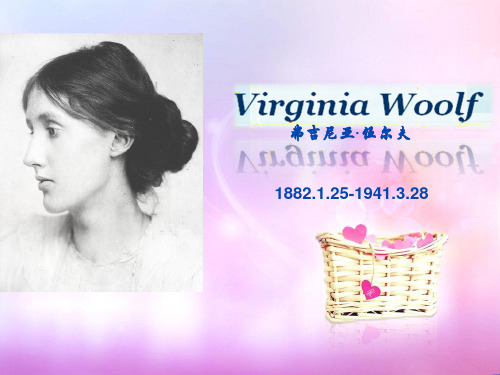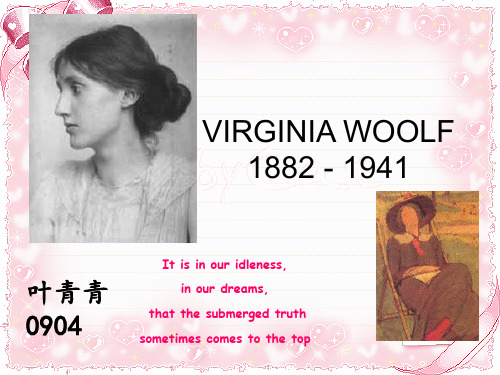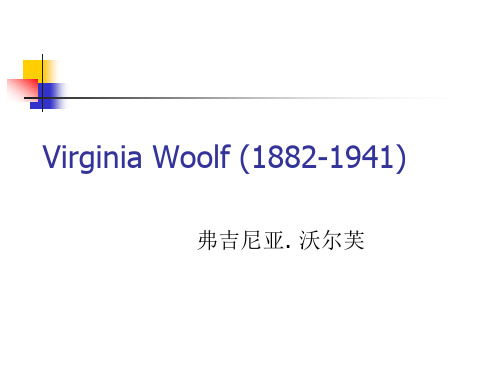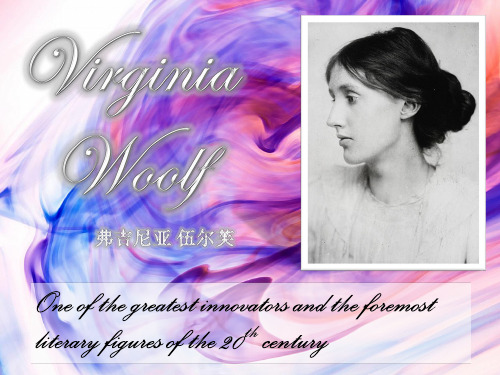virginia woolf
- 格式:doc
- 大小:36.50 KB
- 文档页数:3






伍尔芙经典语录名言名句伍尔芙 (Virginia Woolf) 是 20 世纪著名的英国作家和文学批评家,她的作品和思想影响了现代文学和文化。
以下是一些伍尔芙的经典语录和名言名句:1. "我们的头脑里充满了垃圾,我们需要不断地清理它们。
" ——Virginia Woolf2. "真正的艺术家永远不需要证明自己的作品,因为作品本身就已经足够了。
" ——Virginia Woolf3. "人生唯一的不幸就是自己的无能。
" ——Virginia Woolf4. "真正的艺术是一种让人心境开阔的经验。
" ——Virginia Woolf5. "我们所谓的生活就是不断地被冲击,被挑战,被欺骗,然后不断地重新振作起来。
" ——Virginia Woolf6. "文字是生命的火花,我们应该尽可能地珍惜它。
" ——Virginia Woolf7. "真正的自我不是我们所想象的那样,而是在我们停下来倾听的时候才能发现。
" ——Virginia Woolf8. "人生中最重要的事情不是我们所遇到的困难,而是我们如何克服它们。
" ——Virginia Woolf9. "我们的本质是不断地前进和探索,直到我们最终找到真正的自己。
" ——Virginia Woolf10. "真正的自由是选择自己的束缚。
" ——Virginia Woolf拓展:1. 伍尔芙的许多作品都探讨了女性的地位和命运,如《到灯塔去》、《奥兰多》、《达洛维夫人》等。
2. 伍尔芙的思想深受现代文化的影响,尤其是现代主义和后现代主义。
3. 伍尔芙的作品常常涉及到哲学、心理学和文学理论等主题,被认为是 20 世纪文学的巅峰之作。
4. 伍尔芙被誉为现代主义文学的代表人物之一,与海明威、福克纳等作家一起开创了现代文学的新时代。
弗吉尼亚·伍尔夫(Virginia Woolf),1882 --1941,英国著名女作家,在小说创作和文学评论两方面都有卓越的贡献。
世界三大意识流作家之一,女权主义运动的先驱人物。
深受弗洛伊德心理学、女性主义及同性恋运动影响。
1882.1.25 伍尔夫出生于英国伦敦,肯辛顿,海德公园门(Hyde Park Gate)22号,原名弗吉尼亚·斯蒂芬(Adeline Virginia Stephen)。
父亲莱斯利·斯蒂芬爵士(Leslie Stephen)是维多利亚时代出身于剑桥的一位著名的文学评论家、学者和传记家。
母亲是Julia Prinsep Jackson Stephen。
父母亲在结婚前都曾有过一次婚姻,父亲与前妻有一個女儿Stella,母亲与前夫有三个孩子。
父母结合后又生下四个孩子:V anessa, Thoby, 伍尔夫和Adrian。
伍尔夫在家接受教育。
1895.5 母亲Julia去世,伍尔夫第一次精神崩溃。
1904年2月,伍尔夫的父亲去世。
5月,伍尔夫第二次精神崩溃,并试图跳窗自杀。
1904年末和Vanessa, Thoby, Adrian搬到布卢姆斯伯里的戈登广场46号(46 Gordon Square, Bloomsbury)。
12月14日,弗吉尼亚在《卫报》上第一次发表作品——一篇未署名的书评。
后出版了第一批散文,并开始经常性地为《时代文学增刊》(《Times Literary Supplement》)写书评,同时在一间在职成人夜校Morley College任教。
Thoby的‘Thursday Evenings’宣告布卢姆斯伯里组织(Bloomsbury Group)的成立,伍尔夫是其中的主将。
著名的布卢姆斯伯里团体——一个知识精英的沙龙,其核心成员有:作家伦纳德·伍尔夫(弗吉尼亚的丈夫),艺术批评家克莱夫·贝尔(范妮莎的丈夫),传记作家利顿·斯特雷奇,文学批评家德斯蒙德·麦卡锡,经济学家约翰·梅纳德·凯恩斯,画家邓肯·格兰特,艺术批评家罗杰·弗莱,作家福斯特。
【VirginiaWoolf】弗吉尼亚·伍尔芙意识流的一生英国邦利弗吉尼亚·伍尔芙(Virginia Woolf),许多人因为电影《时时刻刻》而了解她,诞生了三位影后级人物、奥斯卡金像奖。
原著作者为迈克尔·坎宁安(Michael Cunningham),是介绍不同时期、不同地方女性生活状况的小说,其中一位就是弗吉尼亚·伍尔芙。
该书不仅登上了《纽约时报》畅销书榜,同时获得“普利策小说奖”和“笔会/福克纳奖”的双项殊荣。
究竟是一位什么样的人物,使得根据她的故事而创作的电影及小说都能大获成功呢?弗吉尼亚·伍尔芙简介弗吉尼亚·伍尔芙生于1882年,死于1941年。
英国女作家、文学批评家和文学理论家,意识流文学代表人物,被誉为二十世纪现代主义与女性主义的先锋,也是在中国享有盛誉的英国五位女作家之一。
她的第一部小说为《远航》,知名小说包括《达洛维夫人》、《到灯塔去》,1941年完成她的最后一部作品《幕间》,随后自杀。
遗作《幕间》由她丈夫伦纳德整理并出版。
伍尔芙所受的赞誉爱德华·摩根·福斯特(E. M. Forster)称她将英语“朝着光明的方向推进了一小步”。
她革新了英语语言,尝试用意识流的写作方法,她同当时的詹姆斯·乔伊斯、法国的普鲁斯特等作家,把意识流文学推向世界,他们的出现成为了传统文学和现代文学的一个分水岭。
英国作家多丽丝·莱辛认为她在追求真理,但是追求真理的女作家当时并不被人理解。
弗吉尼亚虽然强调独特的女性意识,要求女性成为自己,但她并没有试图去营造一种纯粹的、封闭的、根植于所谓女性本质的女性主义诗学理论,相反,它呈现出开放的趋势。
有人曾这样描述她,“她的记忆有着隐秘的两面:一面澄明,一面黑暗;一面寒冷,一面温热;一面是创造,一面是毁灭;一面铺洒着天堂之火,一面燃烧着地狱之火。
”她终生为癫痫所困,她的精神崩溃令她显得神经质。
伍尔夫诗歌
弗吉尼亚·伍尔夫(Virginia Woolf)是20世纪著名的英国作家,她的创作领域以小说为主,而不是诗歌。
伍尔夫的作品以其独特的叙事风格和对心理学的深入探索而著名。
她的小说涉及到许多复杂的主题,如性别、人类关系、社会结构等。
然而,尽管伍尔夫大部分作品都是小说,但她也曾写过一些散文和短诗。
这些诗歌作品往往与她的小说作品相伴而行,反映了她细腻的观察力和对人类情感的深刻理解。
然而,伍尔夫的诗歌作品并没有得到像她的小说那样的广泛关注和评论。
虽然伍尔夫的诗歌创作相对较少,但她的作品中仍然有一些著名的诗歌。
比如,她的一首名为《磨坊》(The Lighthouse)
的诗歌,是她小说《到灯塔去》(To the Lighthouse)的一个
重要主题之一。
这首诗以其韵律和音韵的美感,表达了诗人对时间、记忆和人类经验的思考。
总而言之,伍尔夫的诗歌虽然不如她的小说作品广为人知,但仍然展示出她独特的文学才华和对人类内心世界的深刻洞察力。
这些诗歌作品为我们提供了一个更加全面了解伍尔夫作品全貌的途径,而她的小说则更为广泛地被认为是她最重要的艺术遗产之一。
Virginia Woolf on How to Read“Do not dictate to your author; try to become him. Be his fellow-worker and accomplice.”“The mind, the brain, the top of the tingling spine, is, or should be, the only instrument used upon a book,” Vladimir Nabokov wrote in h is treatise on what makes a good reader. “Part of a reader‟s job is to find out why certain writers endure,” advised Francine Prose in her guide to reading like a writer. “My encounters with books I regard very much as my encounters with other phenomena of life or thought. All encounters are configurate, not isolate.” Henry Miller confessed in his reflections on a lifetime of reading. But how, exactly, does one read a book, and read it well? That‟s precisely what Virginia Woolf addressed in a 1925 essay titled “How Should One Read a Book?,” found in The Second Common Reader (public library; public domain) —the same collection of 26 exquisite essays that gave us Woolf‟s critique of criticis m and a Literary Jukebox treat.Woolf begins with the same disclaimer of subjectivity that John Steinbeck issued half a century later in his six timeless tips on writing. She writes:The only advice … that one person can give another about reading is to take no advice, to follow your own instincts, to use your own reason, to come to your own conclusions. If this is agreed between us, then I feel at the liberty to put forward a few ideas and suggestions because you will not allow them to fetter that independence which is the most important quality that a reader can possess. After all, what laws can be laid down about books? The battle of Waterloowas certainly fought on a certain day; but is Hamlet a better play that Lear? Nobody can say. Each must decide that question for himself. To admit authorities, however heavily furred and gowned, into our libraries and let them tell us how to read, what to read, what value to place upon what we read, is to destroy the spirit of freedom which is the breath of those sanctuaries. Everywhere else we may be bound by laws and conventions — there we have none.She cautions against bringing baggage and pre-conceived notions to your reading:Few people ask from books what books can give us. Most commonly we come to books with blurred and divided minds, asking of fiction that it shall be true, of poetry that it shall be false, of biography that it shall be flattering, of history that it shall enforce our own prejudices. If we could banish all such preconceptions when we read, that would be an admirable beginning. Do not dictate to your author; try to become him. Be his fellow-worker and accomplice. If you hang back, and reserve and criticize at first, you are preventing yourself from getting the fullest possible value from what you read. But if you open your mind as widely as possible, then signs and hints of almost imperceptible fineness, from the twist and turn of the first sentences, will bring you into the presence of a human being unlike any other. Steep yourself in this, acquaint yourself with this and soon you will find that your author is giving you, or attempting to give you, something far more definite.Woolf reminds us of the osmotic skills of reading and writing:Perhaps the quickest way to understand the elements of what a novelist is doing is not to read, but to write; to make your own experiment with the dangers and difficulties with words.To exercise the imagination, she argues, is itself a special skill:To read a novel is a difficult and complex art. You must be capable not only of great fineness of perception, but of great boldness of imagination if you are going to make use of all that the novelist — the great artist — gives you. As a hopeless lover of old diaries and letters, I was particularly taken with Woolf‟s insight into the appeal of such literary voyeurism — especially given Woolf was a notable diarist herself:How far, we must ask ourselves, is a book influenced by its writer‟s life —how far is it safe to let the man interpret the writer? How far shall we resist or give way to the sympathies and antipathies that the man himself rouses in us — so sensitive are words, so receptive of the character of the author? These are questions that press upon us when we read lives and letters, and we must answer them for ourselves, for nothing can be more fatal than to be guided by the preferences of others in a matter so personal.But also we can read such books with another aim, not to throw light on literature, not to become familiar with famous people, but to refresh and exercise our own creative powers.Woolf moves on to the intricacies of poetry, adding to other famous meditations on what a poem is and what makes it good:The impact of poetry is so hard and direct that for the moment there is no other sensation except that of the poem itself. What profound depths we visit then — how sudden and complete is our immersion! There is nothing here to catch hold of; nothing to stay us in our flight. … The poet is always our contemporary. Our being for the moment is centered and constricted, as in any violent shock of personal emotion. Afterwards, it is true, the sensation begins to spread in wider rings through our minds; remoter senses are reached; these begin to sound and to comment and we are aware of echoes and reflections. The intensity of poetry covers an immense range of emotion.But despite this mystical mesmerism of the experience itself, Woolf reminds us, the true gift of reading takes place in that incubation period wherein ephemeral impressions become integrated and manifest as deeper ideas:The first process, to receive impressions with the utmost understanding, is only half the process of reading; it must be completed, if we are to get the whole pleasure from a book, by another. We must pass judgement upon those multitudinous impressions; we must make of these fleeting shapes one that is hard and lasting. But not directly. Wait for the dust of reading to settle; for the conflict and the questioning to die down; walk, talk, pull the dead petals from a rose, or fall asleep. Then suddenly without our willing it, for it is thus that Nature undertakes these transitions, the book will return, but differently. It will float to the top of the mind as a whole.In a testament to the notion that all creativity builds on what came before, echoing her own teenage insight on imitation and the arts and resonating with Henry Miller‟s contention that “the vast body of literature, in every domain, is composed of hand-me-down ideas,” Woolf observes:[W]e may be sure that the newness of new poetry and fiction is its most superficial quality and that we have only to alter slightly, not to recast, the standards by which we have judged the old.She argues — beautifully —for the cultivation of taste, a concept we‟ve seen paralleled in science, pointing to the very tuning of this compass for excellence as the ultimate existential reward of the art of reading:It would be foolish … to pretend that the second part of reading, to judge, to compare, is as simple as the first —to open the mind wide to the fast flocking of innumerable impressions. To continue reading without the book before you, to hold one shadow-shape against another, to have read widely enough and with enough understanding to make such comparisons alive and illuminating — that is difficult; it is still more difficult to press further and to say, …Not only is the book of this sort, but it is of this value; here it fails; here it succeeds; this is bad; that is good.‟ To carry out this part of a reader‟s duty needs such imagination, insight, and learning that it is hard to conceive any one mind sufficiently endowed; impossible for the most self-confident to find more than the seeds of such powers in himself. Would it not be wiser, then, to remit this part of reading and to allow the critics, the gowned and furred authorities of the library, to decide t he question of the book‟s absolute value for us? Yet how impossible! We may stress the value of sympathy; we may try to sink our won identity as we read. But we know that we cannot sympathize wholly or immerse ourselves wholly; there is always a demon in u s who whispers, …I hate, I love,‟ and we cannot silence him. Indeed, it is precisely because we hate and we love that our relation with the poets and novelists is so intimate that we find the presence of another person intolerable. And even if the results are abhorrent and our judgments are wrong, still our taste, the nerve of sensation that sends shocks through us, is our chief illuminant; we learn through feeling; we cannot suppress our own idiosyncrasy without impoverishing it. But as time goes on perhaps we can train our taste; perhaps we can make it submit to some control. When it has fed greedily and lavishly upon books of all sorts — poetry, fiction, history, biography — and has stopped reading and looked for long spaces upon the variety, the incongruity of the living world, we shall find that it is changing a little; it is not so greedy, it is more reflective.In a passing remark, as she frequently does, Woolf articulates a truth that extends far beyond literature and appliesto just about every aspect of life:[N]othing is easier and more stultifying than to make rules which exist out of touch with facts, in a vacuum.One of her most important points deals with the collective influence we exert as an audience on the nature and quality of what is being written:[I]f to read a book as it should be read calls for the rarest qualities of imagination, insight, and judgment, you may perhaps conclude that literature is a very complex art and that it is unlikely that we shall be able, even after a lifetime of reading, to make any valuable contribution to its criticism. We must remain readers; we shall not put on the further glory that belongs to those rare beings who are also critics. But still we have our responsibilities as readers and even our importance. The standards we raise and the judgments we pass steal into the air and become part of the atmosphere which writers breathe as they work. An influence is created which tells upon them even if it never finds its way into print.This point, while timeless, is timelier than ever today, when we choose — with our clicks, with our subscriptions, with our sharing, with your loyalty — the types of writing and media that get produced. At a time when the reader is being reduced to a monetizable pageview-eyeball, there‟s only so much pagination, so much “sponsored content,” and so many slideshows we can take — the hope is that slowly, if painfully, the media landscape will begin to shift to reflect, and respect, the art of reading and begin to treat the reader as a true “fellow-worker and accomplice.”Woolf reminds us, gently yet assertively, of the value of the amateur in driving culture forward:If behind the erratic gunfire of the press the author felt that there was another kind of criticism, the opinion of people reading for the love of reading, slowly and unprofessionally, and judging with great sympathy and yet with great severity, might this improve the quality of his work?Ultimately, Woolf —an eloquent champion of the joy of reading —considers reading not a means to some intellectual end, but an intellectual and creative reward in itself:I have sometimes dreamt, at least, that when the Day of Judgment dawns and the great conquerors and lawyers and statesmen come to receive their rewards —their crowns, their laurels, their names carved indelibly upon imperishable marble — the Almighty will turn to Peter and will say, not without a certain envy when He sees us coming with our books under our arms, …Look, those need no reward. We have nothing to give them here. They have loved reading.‟。